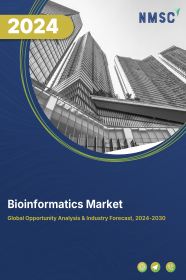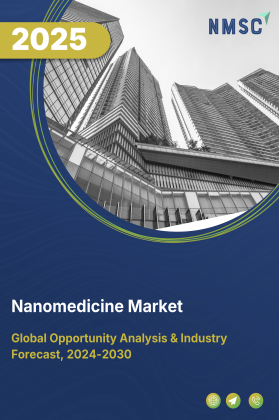
Bioinformatics Market by Products and Services (Knowledge Management Tools, Bioinformatics Platform, and Bioinformatics Services), by Applications (Microbial Genome, Gene Engineering, Drug Development, Personalized Medicine, Omics, and Other Applications) By End-Use (Pharmaceutics, Animal Study, Agriculture, Forensic Science, Other) - Global Opportunity Analysis and Industry Forecast 2022-2030
Market Definition
The global Bioinformatics Market was valued at USD 9.36 billion in 2021 and is predicted to reach USD 26.86 billion by 2030 with a CAGR of 12.7% from 2022-2030. Bioinformatics is an interdisciplinary field that combines biology, computer science, mathematics, and statistics to analyze and interpret biological data. It involves the development and application of computational tools and techniques for the management, analysis, and interpretation of large-scale biological datasets, such as DNA sequences, protein structures, and gene expression profiles.
Bioinformatics plays a crucial role in many areas of biological research, including genomics, proteomics, structural biology, and systems biology. It is used to analyze and interpret genomic data to identify genetic variations, predict protein structure and function, and understand biological processes at the molecular level. Bioinformatics also plays a key role in drug discovery and development by identifying potential drug targets and predicting the efficacy of new drugs.
Market Dynamics and Trends
The increasing usage of bioinformatics in the healthcare industry to analyze and manage large and complex datasets generated by modern healthcare practices is boosting the bioinformatics market growth. It is also adopted in drug discovery to identify potential drug targets and optimize drug design.
Additionally, bioinformatics is used to analyze clinical data, such as electronic health records and medical imaging, to improve patient outcomes and reduce healthcare costs. Thus, bioinformatics plays a critical role in advancing the field of healthcare by providing insights into disease mechanisms, facilitating personalized medicine, and improving patient outcomes.
However, bioinformatics tools and infrastructure can be costly to acquire and maintain, especially for smaller research institutions and organizations with limited budgets. The high cost of entry can act as a restraint for some potential users. On the other hand, the growing bioinformatics in the agriculture industry to improve crop production and management is creating ample growth opportunities for the market.
Market Segmentations and Scope of the Study
The bioinformatics market share is classified on the basis of products and services, applications, end-use, and geography. On the basis of products & services, the market is classified into knowledge management tools, bioinformatics platforms, and bioinformatics services. Based on application, the market is divided into the microbial genome, gene engineering, drug development, personalized medicine, omics, and others. On the basis of end-user, the market is categorized into pharmaceutics, animal study, agriculture, forensic science, and others. The geographical breakdown and analysis of each of the aforesaid segments include regions such as North America, Europe, Asia-Pacific, and RoW.
Geographical Analysis
Asia Pacific held the lion’s share of the bioinformatics market in 2021 and is expected to continue dominating the market during the forecast period. The rising geriatric population in the region that faces a growing burden of age-related diseases, such as cancer, Alzheimer's, and cardiovascular disease is propelling the market growth. Bioinformatics plays a critical role in the diagnosis, treatment, and management of these diseases, as it enables the analysis of large volumes of genomic and clinical data, leading to personalized and effective treatments.
Moreover, the growing cases of cancer across the region boost the market growth. Bioinformatics is used to identify genetic mutations that drive the growth of cancer cells. This information is used to develop personalized treatment plans for individual patients, such as targeted therapies or immunotherapies that can selectively attack cancer cells while sparing healthy cells. According to World Health Organization, about 4,568,754 cancer cases were detected in China in 2020.
The North American region is projected to exhibit substantial growth in the bioinformatics market attributed to the rising usage of cloud-based solutions in industries. This has led to the development of business models in the global market for bioinformatics, such as software-as-a-service (SaaS) models, which are more cost-effective for customers and more flexible for vendors. This has increased the accessibility of biomedical solutions to smaller research groups and startups, thus contributing to the growth of the bioinformatics market.
Moreover, the presence of key market players such as Illumina, Inc. and Thermo Fisher Scientific, Inc., which are engaged in adopting strategies including product launch is boosting the market growth. For instance, in March 2020, Thermo Fisher acquired QIAGEN, a leading provider of life science and molecular diagnostic solutions. The company's flagship technologies are used to amplify and enrich these biomolecules to make them readily accessible for analysis. In addition, QIAGEN's instruments can be used to automate these workflows, while its bioinformatics systems provide customers with relevant, actionable insights.
Competitive Landscape
The bioinformatics industry comprises various market players such as. Illumina, Inc., Thermo Fisher Scientific, Inc., BGI Genomics Co., Ltd., DNAnexus, Inc., Sophia Genetics SA, Partek Incorporated, PerkinElmer, Inc., Agilent Technologies, Seven Bridges Genomics, Inc., Intrexon Bioinformatics Germany GmbH, and others.
In March 2023, SOPHiA GENETICS a cloud-native software company partnered with Agilent to conduct a comprehensive solution for cancer analysis. Agilent and SOPHiA GENETICS' joint efforts will enable labs of all sizes to do cancer analysis in-house without having to send samples or output data to other vendors or labs. As a result, the users will be able to retain useful bioinformatic data for future research or reference.
Also in January 2021, Illumina, Inc. launched Illumina Connected Analytics (ICA). This new and integrated bioinformatics solution provides a comprehensive, private, cloud-based data platform that empowers customers to manage, analyze, and explore large volumes of multi-omics data in a secure, scalable, and flexible environment.
Key Benefits
-
The bioinformatics market report provides a quantitative analysis of the industry estimations from 2022 to 2030. This analysis assists in identifying the prevailing market opportunities to capitalize
-
The study comprises of an extensive analysis of the bioinformatics market, including the current and future trends for depicting the prevalent investment pockets in the market.
-
The information related to key drivers, restraints, and opportunities, and their impact on bioinformatics is provided in the report.
-
The competitive analysis of the market players along with their market share in the bioinformatics industry, is mentioned.
-
The SWOT analysis and Porter’s Five Forces model are elaborated on in the study.
-
The value chain analysis in the market study provides a clear picture of the stakeholders’ roles.
Bioinformatics Market Key Segments
By Products and Services
-
Knowledge Management Tools
-
Bioinformatics Platform
-
Bioinformatics Services
By Application
-
Microbial Genome
-
Gene Engineering
-
Drug Development
-
Personalized Medicine
-
Omics
-
Other Applications
By End-Use
-
Pharmaceutics
-
Animal Study
-
Agriculture
-
Forensic Science
-
Other
By Geography
-
North America
-
U.S.
-
Canada
-
Mexico
-
-
Europe
-
U.K.
-
Germany
-
France
-
Italy
-
Spain
-
Rest of Europe
-
-
Asia-Pacific
-
China
-
India
-
Japan
-
South Korea
-
Australia
-
Rest of Asia-Pacific
-
-
RoW
-
UAE
-
Saudi Arabia
-
South Africa
-
Brazil
-
Remaining countries
-
Key Players
-
Illumina, Inc.
-
Thermo Fisher Scientific, Inc.
-
BGI Genomics Co., Ltd.
-
DNAnexus, Inc.
-
Sophia Genetics SA
-
Partek Incorporated
-
PerkinElmer, Inc.
-
Agilent Technologies
-
Seven Bridges Genomics, Inc.
-
Intrexon Bioinformatics Germany GmbH




















 Speak to Our Analyst
Speak to Our Analyst

























